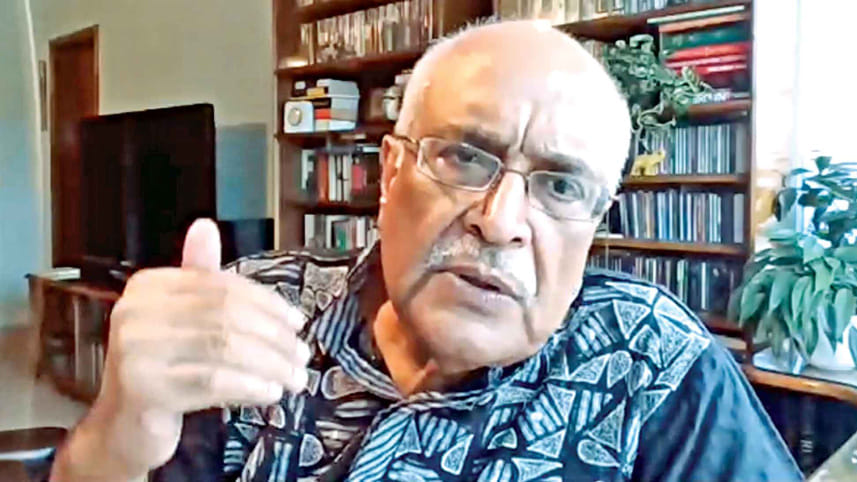Post-LDC era: Negotiate intensively for patent waiver

Bangladesh should launch intensive negotiations with World Trade Organization (WTO) members to secure the benefits of the platform's agreement on the Trade-Related Aspects of Intellectual Property Rights (TRIPS), said a noted economist yesterday.
This should continue even after Bangladesh makes the United Nations status graduation from a least developed to a developing country in 2026, said Debapriya Bhattacharya at a virtual discussion with a group of journalists.
The WTO General Council will discuss the extension of the TRIPS benefits for both the LDCs and those who made the status graduation in a meeting in Geneva on July 26-27.
"…Bangladesh – in view of the upcoming General Council meeting - needs to mount a robust negotiating effort and demonstrate necessary political initiative," said Bhattacharya, a former Bangladesh ambassador to the WTO.
If Bangladesh cannot make good progress in securing the facility in the upcoming meeting, it will have to raise the issue in the 12th Ministerial Conference (MC12) scheduled for November 30 to December 3 this year, he said.
However, the run-up time to the MC-12, an apex WTO meeting, is also quite short, said Bhattacharya, also a member of the UN Committee for Development Policy (CDP).
So, Bangladesh should take up a strong political initiative, said the distinguished fellow of the Centre for Policy Dialogue (CPD).
Bangladesh missions in some influential destinations abroad like Washington, Brussels, London, Paris and Tokyo should also play a very active role prior to the general council meeting to secure support in favour of the TRIPS extension beyond 2026, he said.
Apart from the ambassadors, the Ministry of Foreign Affairs and the country's private sector should also play a critical role, he also said.
Securing the TRIPS extension is very important for both the LDCs and those graduating to make intellectual properties available to low income countries so that the masses can access goods at affordable prices, said Bhattacharya.
For instance, Bangladesh's pharmaceutical industry has developed a lot over the years because of a TRIPS waiver for this LDC, he said.
Currently, local pharmaceuticals can meet more than 95 per cent of the demand at home and has also been exporting to many countries.
Through this very promising sector, Bangladesh has exported pharmaceutical products worth $169 million, registering a 25 per cent year-on-year growth last fiscal year, he said.
However, the TRIPS facility might not continue forever for the LDCs, including Bangladesh. The country should also not always seek trade preferences from the developed and developing countries, he said.
Rather, Bangladesh should improve its local market and infrastructure related to innovation and intellectual property, such as active pharmaceuticals ingredient (API) parks.
The current global market for intellectual property is valued at $410 billion and these dominate the fourth industrial revolution, he said.
In future, when Bangladesh signs any preferential, bilateral or free trade agreement or a comprehensive economic partnership, it will need to consider the TRIPS carefully, he also said.
Usually, the TRIPS facilities are not given to countries which have already made the status graduation. Countries face challenges on making the status graduation as prices of some essential goods climb up.
However, there are some exceptions and it depends on strong negotiation capabilities, such as that of the Maldives, which was able to secure its TRIPS facility even after making the status graduation, Bhattacharya said.
As per the CDP recommendations, Bangladesh's status graduation is scheduled for 2026 and the TRIPS facilities for pharmaceuticals of the LDCs, existing since 1995 and having undergone a second extension, was available until 2034.
So, as per the WTO rules, the TRIPS facilities for Bangladesh will come to an end in 2026, he said.
However, Bangladesh can utilise effective negotiations to enjoy the TRIPS benefits beyond 2026, said the CPD distinguished fellow.
A current proposal seeks the pharmaceutical benefits for another 12 years for the LDCs in a post-graduation phase.
There are currently seven graduating LDCs among the WTO members, Bhattacharya said in his presentation.
While Chad placed the proposal on behalf of the LDC Group in the WTO, a large number of member states went on record to appreciate the constructive role played by the Bangladesh delegation in this regard.
Some 35 LDC members of the WTO, including Bangladesh, out of a current total of 46, will definitely benefit from the decision.



 For all latest news, follow The Daily Star's Google News channel.
For all latest news, follow The Daily Star's Google News channel.
Comments